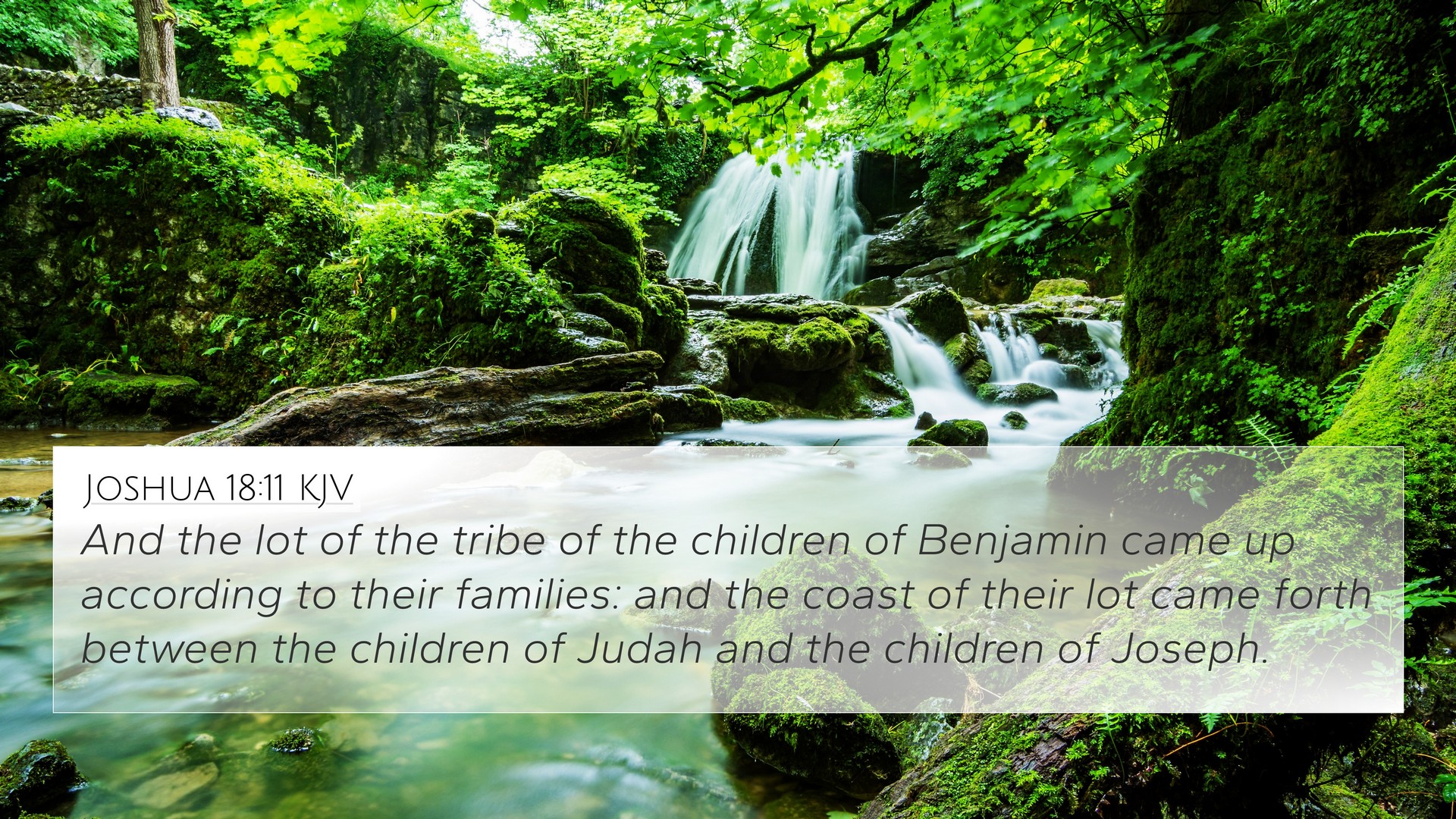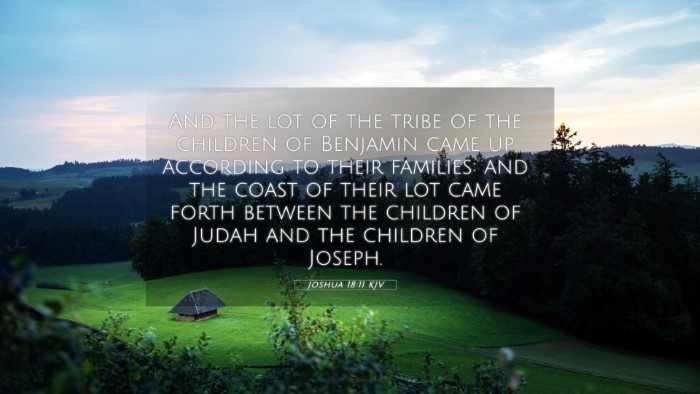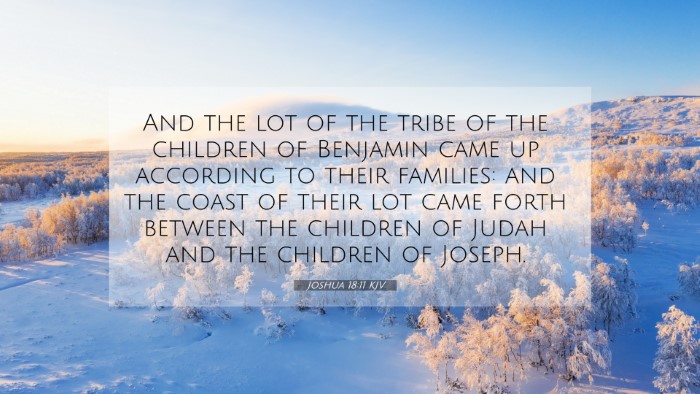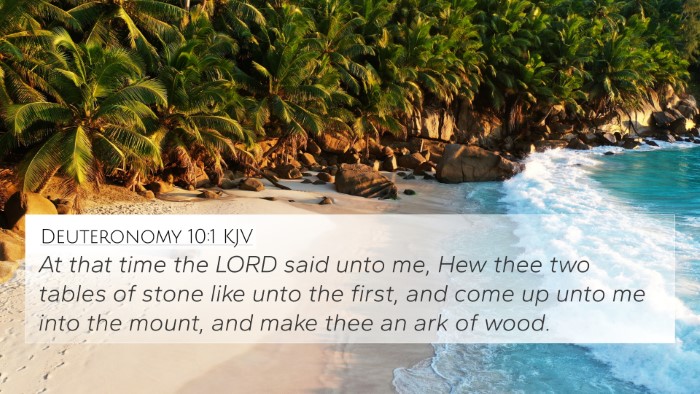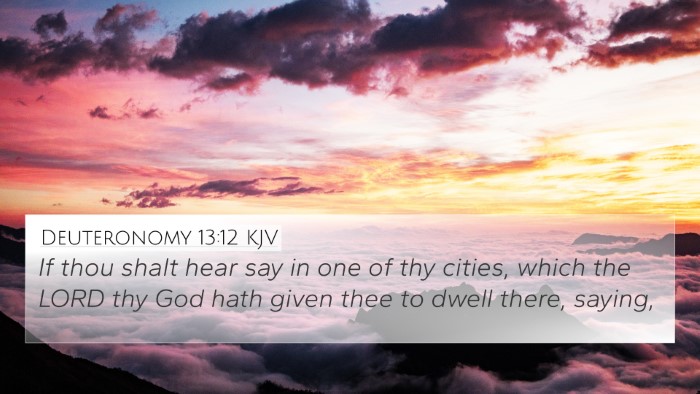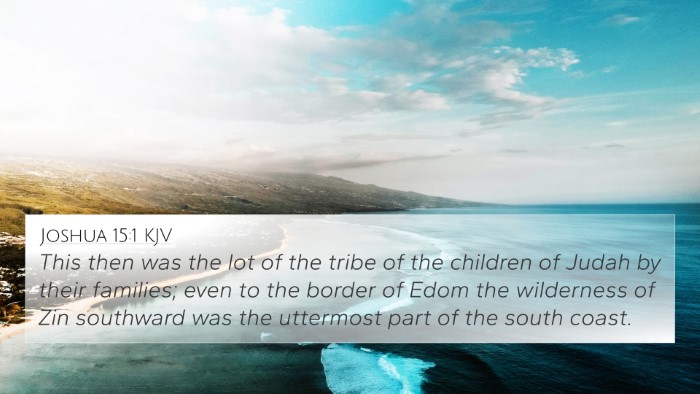Understanding Joshua 18:11
Joshua 18:11 states, "And the lot of the tribe of the children of Benjamin came up according to their families: and the coast of their lot came forth between the children of Judah and the children of Joseph." This verse marks a significant moment in the distribution of land among the tribes of Israel as they settled in the Promised Land.
Meaning and Context
This verse finds itself in the context of the Israelites taking possession of Canaan under Joshua's leadership. The land is divided among the twelve tribes, a foundational event in the history of Israel.
Matthew Henry emphasizes the divine authority and organization in the division of the land, indicating that it was a structured process guided by God's will. Albert Barnes notes that the geographical location of Benjamin holds both significance and strategic importance, lying between the more prominent tribes of Judah and Joseph, thus highlighting its role in the nation's unity.
Adam Clarke elaborates on the implications of the lot assigned to Benjamin, emphasizing the symbolic and literal significance of land ownership in Israel's identity and in God's promise to His people. The specific assignments of land not only provided physical territory but also fostered a sense of belonging and societal structure.
Bible Cross-References
Joshua 18:11 can be cross-referenced with several other scriptures that relate to land distribution, the priorities of the tribes, and broader themes within the biblical narrative:
- Genesis 49:7 - Jacob's blessing mentions Benjamin and hints at his fierceness.
- Joshua 1:3 - God's command to Joshua to lead Israel into the Promised Land.
- Judges 1:21 - The inability of the tribe of Benjamin to drive out the Jebusites, highlighting their challenges.
- 1 Samuel 9:1 - The introduction of a Benjamite, Saul, emphasizing the tribe's continuing significance in Israel's life.
- Acts 13:21 - References Saul’s lineage as a Benjamite, connecting back to this foundational location.
- Jeremiah 32:44 - Prophecy regarding the restoration of the land, showing ongoing relevance.
- Romans 11:1 - Paul’s mention of being of the tribe of Benjamin, demonstrating the tribe's lasting legacy.
Connections Between Bible Verses
This verse serves as a bridge to understanding the intricate connections between various Biblical themes, particularly regarding land ownership and tribal identity in Israel.
Thematically, Joshua 18:11 relates to concepts of inheritance and God's covenant with His people. By cross-examining Benjamin's placement among the tribes, one can explore the broader narrative of unity and division within Israel, as seen from various perspectives through both the Old and New Testaments.
Among the tools for Bible cross-referencing, the Bible concordance provides a valuable resource for identifying these connections. This allows readers to explore the cross-reference Bible study using various methods, helping them understand inter-Biblical dialogues and thematic links across different books.
How to Use Bible Cross-References
For those looking to engage in cross-referencing Bible study, it is essential to:
- Utilize a Bible concordance to find verses with similar themes or subjects.
- Investigate cross-references for sermon preparation, ensuring a biblically-supported message.
- Employ the Bible cross-reference system to analyze connections between Old and New Testament teachings.
- Consider detailed cross-references between Gospels to deepen understanding of biblical events and their implications.
- Examine the comprehensive Bible cross-reference materials available for scholarly study and personal reflection.
Conclusion
Joshua 18:11 offers a narrow yet rich glimpse into the complexities of Israel's tribal structure and the divine orchestration of land assignments. By exploring related verses and employing various cross-referencing tools, scholars and believers alike can gain deeper insights. This verse becomes a pivotal point in understanding God's promises and the unfolding narrative of His people through history.
Further Study
For additional exploration, consider themes connected to:
- Identifying connections between Old and New Testament
- Cross-referencing Psalms with New Testament teachings
- Links between the Prophets and Apostolic teachings
These themes will enrich your understanding and appreciation of the scriptures, allowing for a profound engagement with God's Word.
